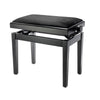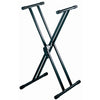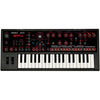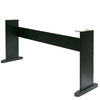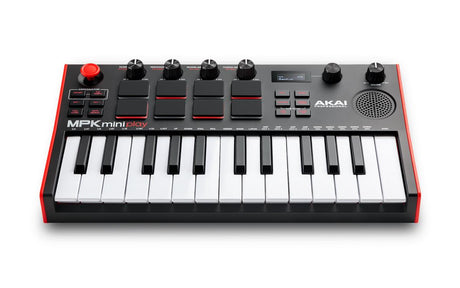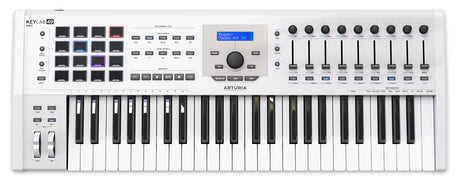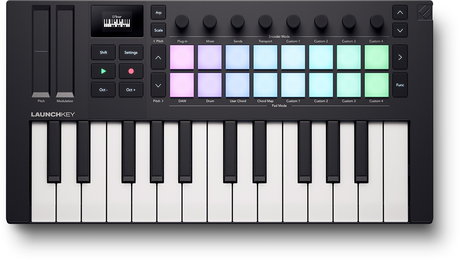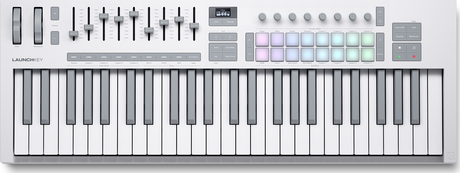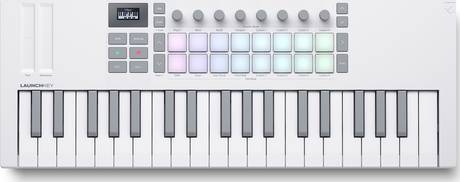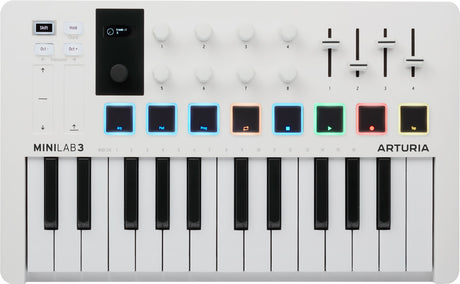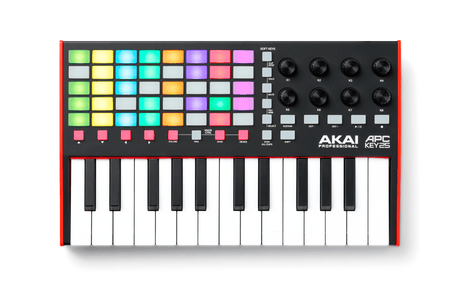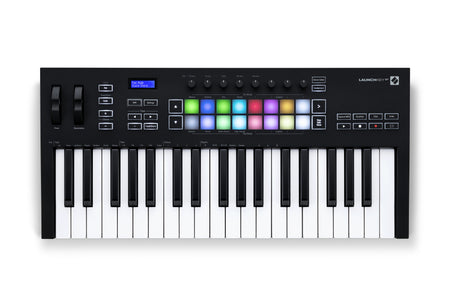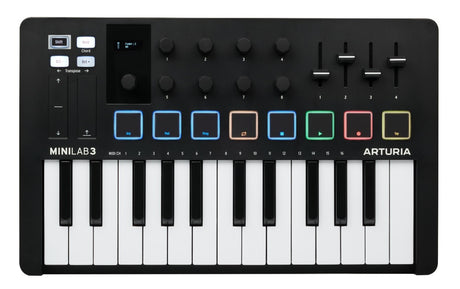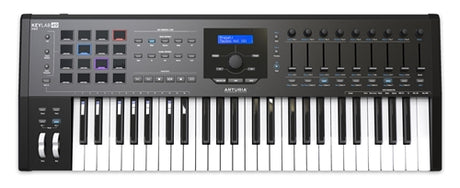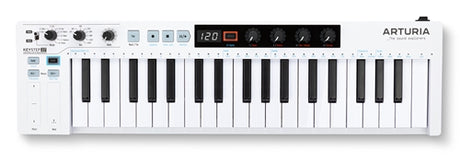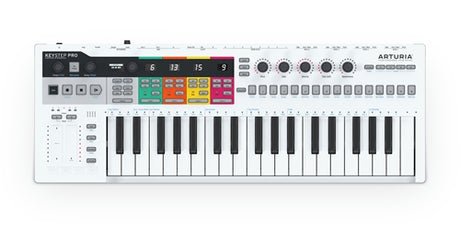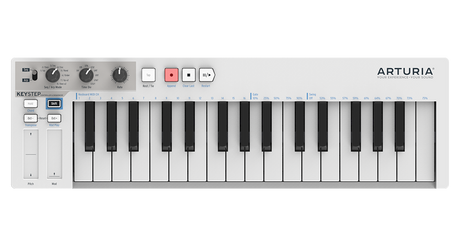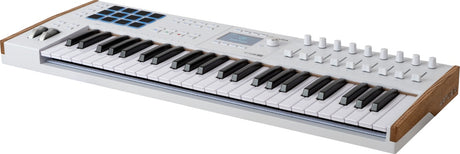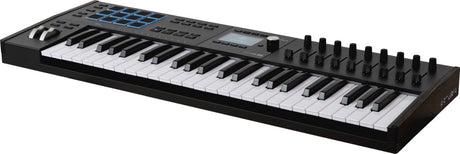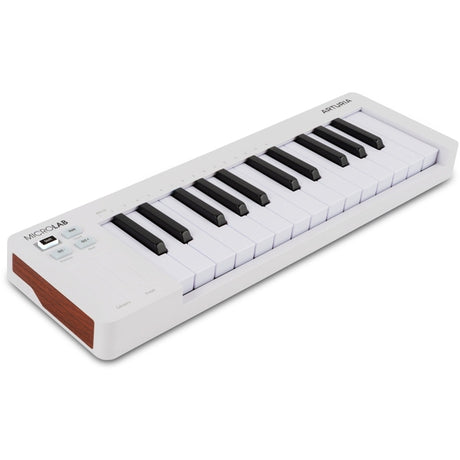MIDI-keyboard
Et MIDI-keyboard er et simpelt "tastatur", der ikke selv laver lyd, men sender digitale styresignaler (MIDI-data) til en computer, en lydmodul, en synthesizer eller anden elektronik. Når du trykker på en tangent, drejer en knap eller slår på en pad, sender keyboardet information om tonehøjde, varighed, styrke og kontrolværdier, som modtageren omsætter til lyd. På den måde bliver et MIDI-keyboard centrum for din musikproduktion, komposition og live-performance, uanset om du arbejder i et hjemmestudie, på laptop eller på scenen.
Hos SoundStoreXL finder du et bredt udvalg af MIDI-keyboards – lige fra ultrakompakte mini-keyboards til fuldstørrelses klaviaturer med 88 tangenter og avancerede kontrolflader. Sortimentet spænder over kendte serier fra eksempelvis Akai, Arturia, Novation, Korg, Roland og iCon, så du kan vælge præcis den type controller, der passer til din arbejdsstil, dit niveau og dit budget.
Sådan vælger du den rigtige type MIDI-keyboard
Valget af MIDI-keyboard handler først og fremmest om, hvordan du arbejder med musik, og hvor meget fysisk plads du har. Derudover spiller antallet af tangenter, typen af keybed, ekstra kontrolmuligheder og tilslutning en stor rolle for, hvor fleksibelt keyboardet bliver i praksis.
Start med at overveje disse spørgsmål: Skal keyboardet kunne ligge i en rygsæk og bruges på farten? Skal du primært spille enkle melodier, beats og baslinjer, eller vil du også kunne spille to-hændige klaverstykker? Har du brug for mange pads, faders og knapper til at styre din DAW? Svarene på disse spørgsmål guider dig direkte mod den rigtige størrelse og type MIDI-keyboard.
Teknologier og funktioner
- Antal tangenter og keybed-typer – hvad betyder det for spilbarhed og pladsforbrug
- Kontroller: pads, knobs, faders, pitch/modulation og aftertouch
- Tilslutning, strøm og integration med computer, hardware og DAW
Antal tangenter er et af de vigtigste valg. Mini- og 25-tangenters MIDI-keyboards er meget kompakte og oplagte til mobil produktion, elektronisk musik og beatmaking. 37- og 49-tangenters keyboards giver mere rækkevidde til melodier og akkompagnement, men fylder stadig relativt lidt på skrivebordet. 61-tangenters modeller og fuldlængde-keys med 88 tangenter retter sig mod dig, der spiller meget klaver, vil kunne udføre mere komplekse arrangementer og ønsker en så klaverlignende oplevelse som muligt.
Keybed-typen varierer fra lette synth-tangenter og mini-tangenter til semi-vægtede og fuldt vægtede hammer-action tangenter. Synth- og mini-tangenter er hurtige og velegnede til elektroniske lyde, leads og hurtige passager, mens semi-vægtede og vægtede tangenter er mere oplagte til klaverlyde og dynamisk spil. Mange MIDI-keyboards i mellem- og topklassen har anslagsfølsomhed og eftertryk (aftertouch), så du kan forme lyden med variation i anslag og tryk, uden at skulle bruge ekstra kontroller.
De fleste moderne MIDI-keyboards er meget mere end bare tangenter. De kan være komplette MIDI-keyboard controllere med trommepads, endeløse drejeknapper, fadere, transportknapper, arpeggiator, akkordtilstande og skalafunktioner. Pads bruges typisk til trommer, samples og clip-launching, mens knobs og faders kontrollerer volumener, filter, effekter og andre parametre i din DAW eller dine softwareinstrumenter. Pitch- og modulationshjul eller touch-strips giver direkte udtryk til bends, vibrato og filter-sweeps, og gør keyboardet langt mere levende i brug.
Tilslutningsmæssigt er USB det mest udbredte. Et USB MIDI-keyboard trækker ofte strøm direkte fra computeren og kræver ingen ekstern strømforsyning. Mange modeller har også klassiske MIDI-udgange, så du kan styre hardware-synthesizere og trommemaskiner uden om computeren. Enkelte keyboards tilbyder desuden CV/Gate-tilslutninger til modulare og analoge synths. Vælger du et MIDI-keyboard med både USB, traditionel MIDI og eventuelt CV/Gate, får du en controller, der kan vokse med dit setup over mange år.
SoundStoreXL fører MIDI-keyboards fra en række veletablerede producenter, der hver har deres styrker og fokusområder. Akai er især kendt for kompakte MIDI-keyboards og mini-keyboards med kraftige trommepads og funktioner, der henter inspiration fra klassiske samplere. Disse keyboards er oplagte til beatmaking, elektronisk musik og mobil produktion, hvor du ønsker meget kontrol på minimal plads.
Arturia tilbyder flere serier af MIDI-keyboards og keyboard controllere, lige fra små USB mini-keyboards til veludstyrede 49-, 61- og 88-tangenters modeller med dyb integration til softwareinstrumenter. Mange af Arturias keyboards har avancerede funktioner som arpeggiatorer, skala- og akkordtilstande, samt omfattende DAW-integration. De egner sig både som hjertet i hjemmestudiet og som robuste live-controllere.
Novation har fokus på MIDI-keyboard controllere med stærk DAW-integration og et stort antal pads og knapper. Serien af MIDI-keyboards spænder fra ultra-kompakte mini-keyboards til 61-tangenters controllere med semi-vægtede tangenter. Disse keyboards er velegnede til elektroniske musikere, live-performere og producere, der ønsker at styre deres DAW direkte fra klaviaturet.
Korg tilbyder både microkey USB/MIDI keyboards og Air-varianter, der lægger vægt på kompakthed og enkel tilslutning. De er oplagte til dig, der primært mangler et let klaviatur til at indtaste toner og akkorder i din DAW uden en stor kontrolsektion. Roland er kendt for solide MIDI-keyboards med fokus på spilbarhed og pålidelige tangenter, ofte i 49-tangenters klassen med enkel plug-and-play USB-tilslutning.
iCon leverer MIDI-keyboards og kontroller-keyboards med mange tangenter og en mere studieregnet tilgang. Her får du ofte lange keybeds, faders, drejeknapper og dyb integration til DAW via protokoller som Mackie Control og HUI. Disse keyboards henvender sig til den seriøse hjemmeproducer eller projektstudiet, der ønsker hardwarestyring af mix, transport og spor, uden at skulle røre musen hele tiden.
Anvendelse
Et MIDI-keyboard anvendes forskelligt afhængigt af, om du er nybegynder, rutineret producer, live-musiker eller underviser. Den samme type keyboard kan derfor løse vidt forskellige opgaver i praksis, hvis du vælger rigtigt i forhold til størrelse og funktioner.
Til nybegynderen, der vil i gang med musikproduktion, er et lille MIDI-keyboard med 25 eller 37 tangenter ofte rigeligt. Her er det en fordel at vælge et MIDI-keyboard controller-setup med integreret arpeggiator, pads og enkel DAW-integration, så du hurtigt kan skitsere idéer, spille simple melodier og programmere trommer. Mange kompakte MIDI-keyboards leveres med begyndervenlige softwarepakker og presets, som gør det nemt at komme i gang uden stor teknisk erfaring.
Til den mere øvede producer, der arbejder målrettet i en DAW og måske har et lille hjemmestudie, vil 49 eller 61 tangenter ofte være det bedste kompromis. Her får du nok rækkevidde til at spille med begge hænder og lave seriøse arrangementer, samtidig med at keyboardet stadig kan være på skrivebordet foran skærmen. Vælg gerne en model med anslagsfølsomme pads, flere faders og drejeknapper, så du kan styre volumener, filtre og effekter direkte fra keyboardet.
Til live-brug er robusthed, pålidelighed og gode kontrolmuligheder altafgørende. Mange live-musikere vælger 49- eller 61-tangenters MIDI-keyboards, fordi de giver en god balance mellem spilbarhed og transportvenlighed. Her er det en fordel med tydelig LED-feedback på pads og knapper, dedikerede transport- og scene-kontroller samt sikre tilslutninger. Nogle vælger et fuldlængde MIDI-keyboard med 88 tangenter og hammer-action, hvis hovedfokus er klaverspil kombineret med softwareinstrumenter.
Til undervisning og komposition kan et 61- eller 88-tangenters MIDI-keyboard være en fordel, da det minder mest om et akustisk klaver. Her er det praktisk at kunne spille et bredt repertoire uden transponering og at have et stabilt keyboard, som elever hurtigt forstår. Muligheden for at kombinere notation i en DAW med MIDI-input gør det også attraktivt for komponister og arrangører, der vil skrive partitur digitalt.
Software og kompatibilitet
Et MIDI-keyboard er først rigtigt nyttigt, når det er forbundet til den rette software. De fleste moderne keyboards fungerer som USB MIDI-keyboards, der er class compliant og genkendes automatisk af både Windows og Mac, ofte uden særskilt driverinstallation. Når computeren ser keyboardet som en MIDI-enhed, kan du tilknytte det som input i din DAW og begynde at spille på virtuelle instrumenter.
Talrige MIDI-keyboards leveres med en softwarepakke, der typisk indeholder en let DAW-version, udvalgte virtuelle instrumenter og lydbiblioteker. Det kan være alt fra klaver- og synth-lyde til komplette lydpakker med trommer, pads og orkesterlyd. Denne type pakker giver dig et komplet udgangspunkt for musikproduktion, selv om du ikke i forvejen har software installeret.
Kompatibilitet rækker også længere end computeren. Mange keyboards har traditionelt MIDI-output, så du kan styre hardware-synths, trommemaskiner og lydmoduler direkte. Nogle modeller har desuden CV/Gate-udgange, som gør det muligt at integrere modulare eller andre analoge systemer. Hvis du på sigt forventer at udvide dit setup med eksterne enheder, er det derfor fornuftigt at vælge et MIDI-keyboard, der understøtter både USB og klassiske MIDI-tilslutninger.
Når det gælder DAW-integration, har en række MIDI-keyboards forudkonfigurerede mappings og dedikerede kontroller til transport, spor-skift, mixer-funktioner og device-kontrol. Det betyder, at knapper, faders og drejeknapper automatisk styrer centrale funktioner i din DAW uden manuel opsætning. Denne type integration sparer meget tid og gør workflowet mere flydende, fordi du kan arbejde med musik i stedet for mus.
Ofte stillede spørgsmål
Der er en række typiske spørgsmål, som går igen, når det handler om MIDI-keyboards. Nedenfor finder du korte og praktiske svar, der hjælper dig med at vælge og bruge dit keyboard optimalt, både i hjemmestudiet og til live.
Hvad er forskellen på et MIDI-keyboard og et almindeligt keyboard? Et almindeligt keyboard eller digitalpiano har indbyggede lyde og højttalere, så det kan spille alene. Et MIDI-keyboard sender derimod kun MIDI-data og kræver en ekstern lydkilde som en computer med DAW, en hardware-synth eller en lydmodul. Fordelen ved MIDI-keyboards er fleksibilitet, fordi du frit kan skifte mellem virtuelle instrumenter og lydkilder uden at skifte hardware.
Er et MIDI-keyboard godt til begyndere? Et MIDI-keyboard er ideelt til begyndere, der vil ind i musikproduktion og elektronisk musik. Du kan starte med et lille USB MIDI-keyboard, som er nemt at tilslutte og ofte leveres med software, så du hurtigt kan komme i gang. Det kræver ikke mere end en bærbar computer og lidt tid til at lære grundlæggende funktioner i en DAW.
Hvor mange tangenter skal jeg vælge? Hvis du primært vil lave beats, baslinjer og simple melodier, kan et MIDI-keyboard mini eller et 25-tangenters keyboard være nok. Arbejder du mere med klaver, akkorder og arrangementer, er 49 eller 61 tangenter et godt kompromis. Ønsker du klaverlignende spil og fuld rækkevidde, er 88 tangenter det mest fleksible, især når det kombineres med vægtet keybed.
Kan jeg bruge et MIDI-keyboard uden computer? Ja, hvis keyboardet har traditionel MIDI-udgang eller USB-tilslutning til kompatible hardware-enheder, kan du bruge det til at styre synths, lydmoduler eller andre instrumenter uden en computer. Mange vælger dog at kombinere hardware og computer, så MIDI-keyboardet både kan styre fysiske enheder og virtuelle instrumenter.
Skal jeg vælge et simpelt eller avanceret MIDI-keyboard? Det afhænger af dit workflow. Hvis du mest vil spille toner og optage melodier, kan et simpelt USB MIDI-keyboard med få funktioner være tilstrækkeligt. Hvis du derimod vil styre mixer, effekter, trommer og scene-lancering fra keyboardet, er et mere avanceret MIDI-keyboard controller-setup med pads, faders og dyb DAW-integration den bedste løsning.
Hvordan vedligeholder jeg mit MIDI-keyboard? Hold keyboardet tørt, fri for støv og væsker og undgå at belaste tangenterne unødvendigt. Rengør ydersiden med en tør eller let fugtig klud uden aggressive rengøringsmidler. Opbevar keyboardet i etui eller taske, hvis det ofte transporteres, især hvis det er et mini-keyboard, der skal med i rygsækken.
Køb MIDI-keyboard hos SoundStoreXL
Når du køber dit MIDI-keyboard hos SoundStoreXL, får du adgang til et sortiment sammensat til både begyndere, ambitiøse hjemmeproducere og professionelle brugere. Udvalget dækker alt fra små USB mini-keyboards til omfattende MIDI-keyboard controllere med mange tangenter, pads, faders og tilslutninger. Du kan dermed vælge præcis den type MIDI-keyboard, der matcher din DAW, din arbejdsstil og dit budget.
SoundStoreXL lægger vægt på klar produktinformation, saglig rådgivning og professionel kundeservice. Har du spørgsmål til, om du skal vælge 25, 49, 61 eller 88 tangenter, om et MIDI-keyboard mini er nok til dine behov, eller hvilken type controller der passer bedst til din DAW, kan du få kvalificeret hjælp inden køb. Dermed står du stærkere, når du skal investere i et MIDI-keyboard, der skal være en central del af dit setup i mange år.
Uanset om du er i gang med dit første hjemmestudie, ønsker at opgradere til et mere omfattende MIDI-keyboard controller-setup, eller mangler et ekstra kompakt keyboard til live-brug, finder du en relevant løsning i sortimentet hos SoundStoreXL. Med gennemtænkte produkter fra anerkendte brands, sikker handel og dansk support får du et stabilt udgangspunkt for at arbejde effektivt og kreativt med MIDI i både studie og på scene.



